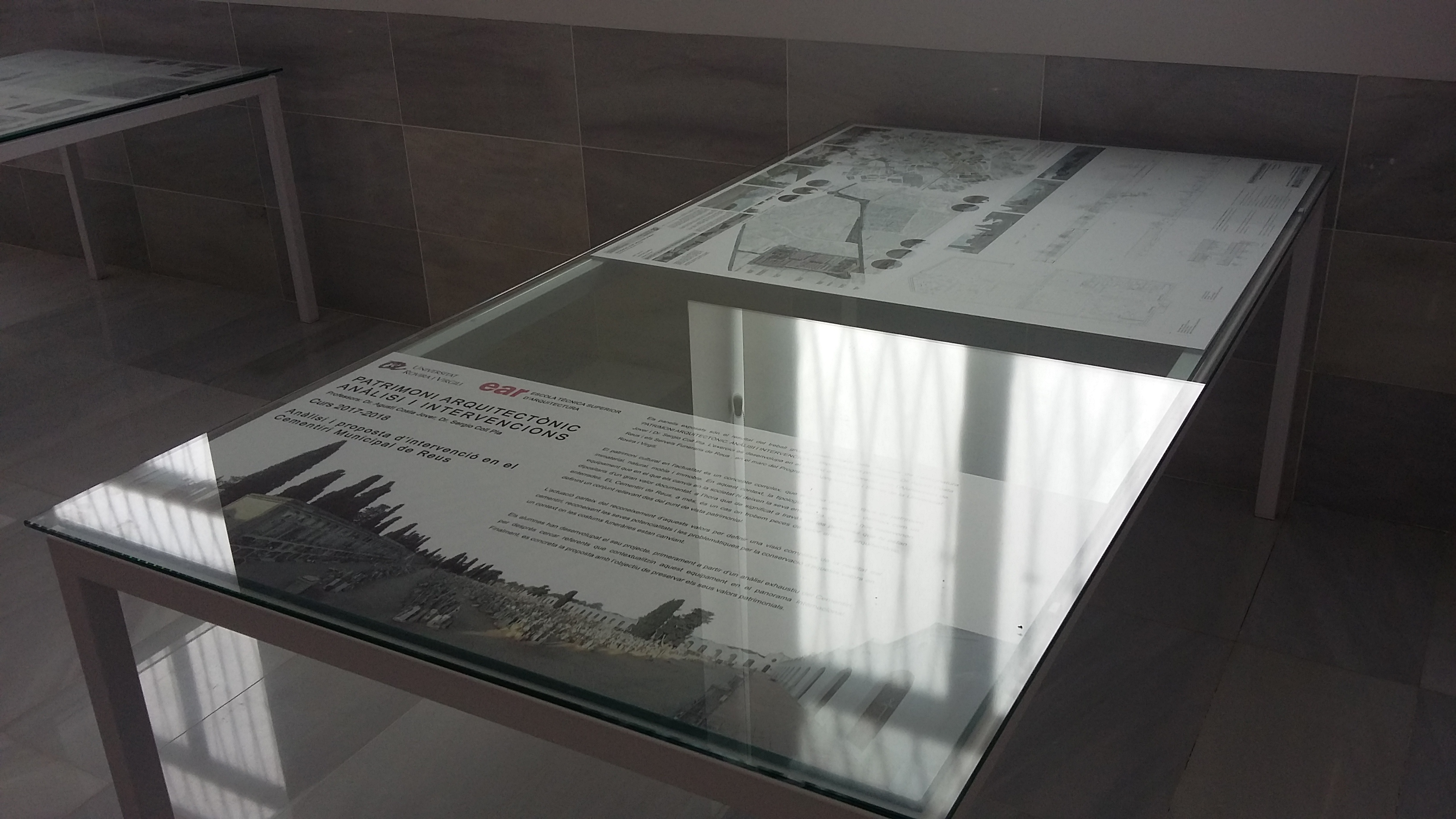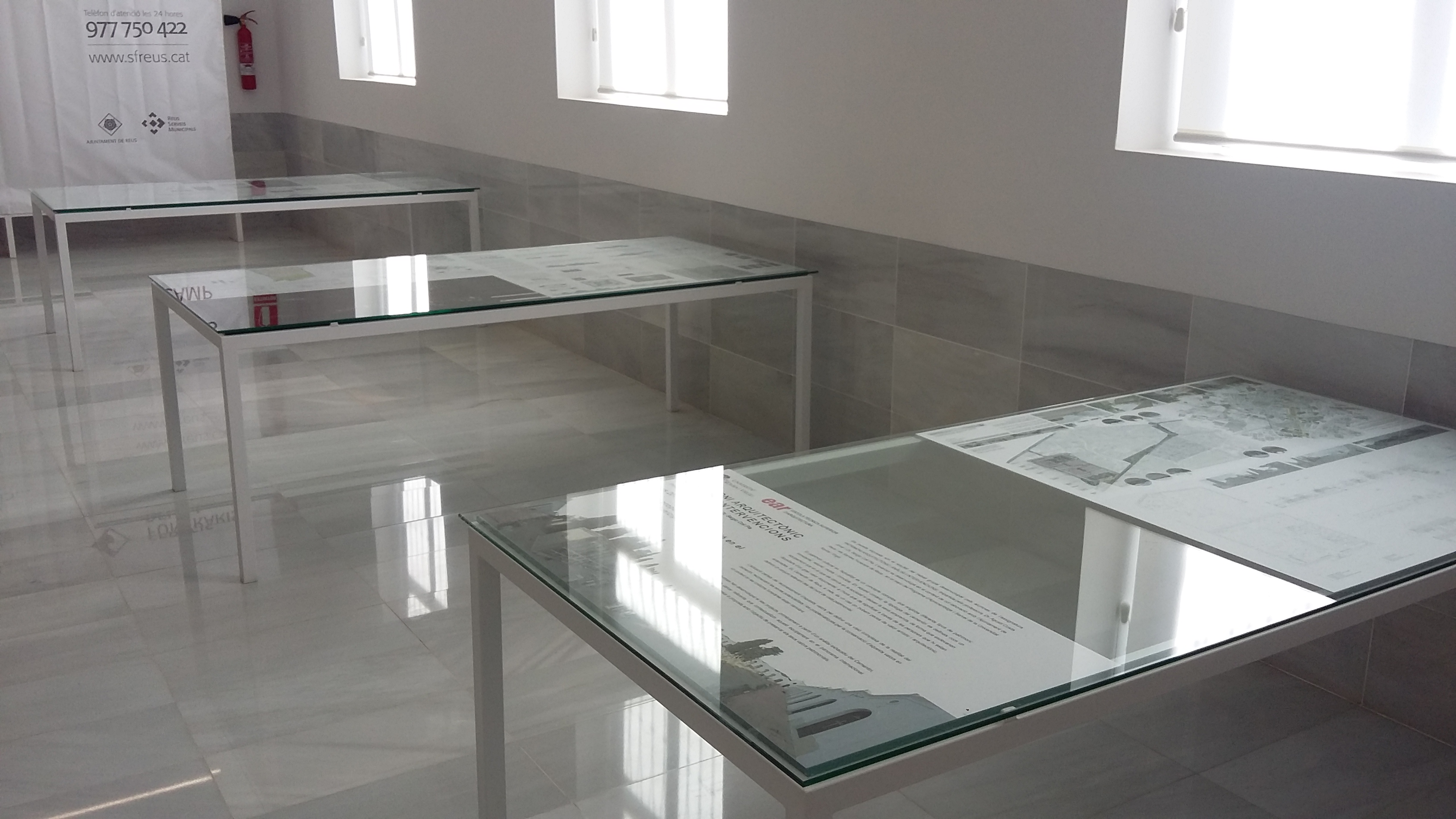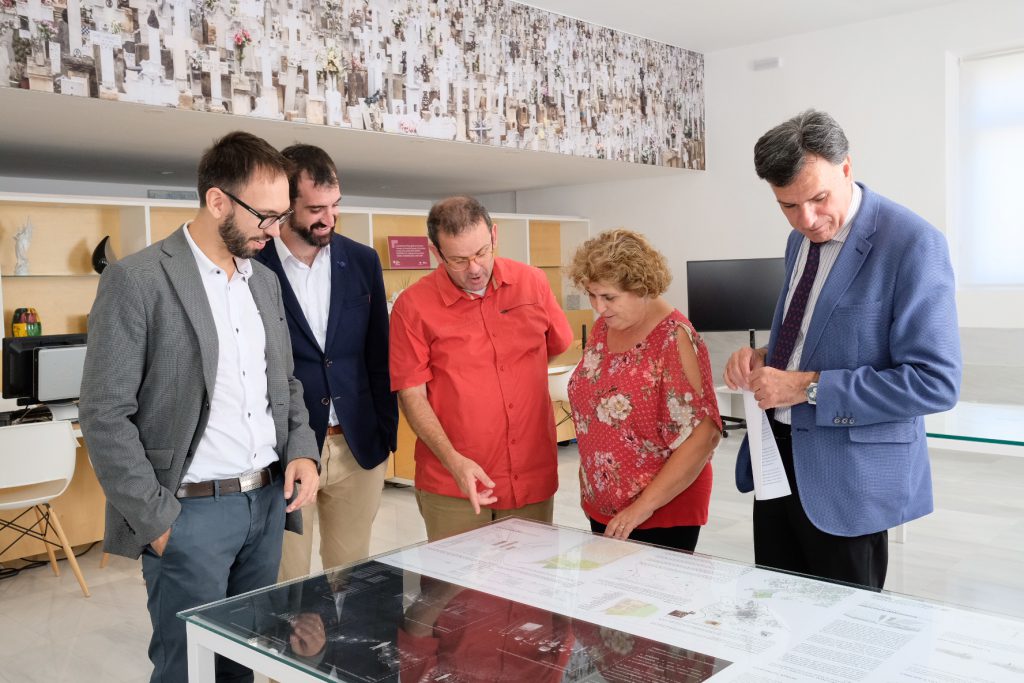Service Learning in the Bachelor's Degree in Architecture
- Third-year courses
- Fourth-year courses
- Sustainability in the contemporary city
- Architectural heritage: analysis and interventions
- Theory and practical of the architectural heritage restoration
- Instalations III
- Final Bachelor’s Degree Project - Design of a wine route in the municipalities of Falset and Marçà
- Final Bachelor’s Degree Project - Analysis and recovery of historical-natural spaces in Tamarit
- Final Bachelor’s Degree Project - Proposal for the use of an outdoor space in the modernist building of the Cooperativa Obrera
- Final Bachelor’s Degree Project – Energy sustainability for a modernist building for cultural purposes in Tarragona
- Final Bachelor’s Degree Project - Development of an architectural proposal with Tarragona City Council
- Fifth-year courses
- Optional courses
Construction IV
- Coordination: Sergio Coll Pla (sergio.coll(ELIMINAR)@urv.cat)
- Community organization: Sant Pau de Reus School.
- Summary: The subject Construction IV introduces students to what is involved in a technical architectural project. The first practical project shows them that the technical solutions used need to be appropriate to the needs of the project. Thus, the exercise requires the student to find a technical solution to a small project linked to a real situation: a school playground. The project involves two aspects of great importance: first, the approach to children and families, the problems of growth and the need to constantly adapt to new spaces and challenges, and the playground as a space for learning and self-experimentation under the control of the school; and, second, the approach to tools, new materials and new study concepts through experimentation with non-toxic and safe biodegradable materials.
Sustainability in the contemporary city
- Coordination: Carles Barberà Escoí (carlos.barbera(ELIMINAR)@urv.cat)
- Community organization: Lluis Domènech i Montaner Secondary School, Reus City Council.
- Summary: There are two projects. The first is carried out with the Lluís Domènech i Montaner Secondary School, a very old building that has been properly maintained, but which shows deficiencies in terms of energy efficiency. Architecture students do real practical work and also come into first-hand contact with the current situation of public buildings. They become aware of the need to act to improve energy efficiency, and are proud to be of use to the educational community because their work will be made available to the school so that it can decide what measures to apply. The center will be subjected to an energy audit that, although not a professional one, will help to identify the main problems regarding the management of energy resources. In this way, we can propose economic solutions that have high energy savings. In the second project, students must diagnose the bicycle transportation needs of the city of Reus and propose different alternatives based on the possibilities of using municipal facilities, as well as road networks and connection nodes. The student body experiences the difficulty of promoting sustainable mobility measures in terms of both cost and the habits of the general public. The service is provided to the Reus City Council, which will receive assessments on the Bicycle Implementation Plan so that the Plan and the service can be improved.
Architectural heritage: analysis and interventions
- Coordination: Agustí Costa Jover (agusti.costa(ELIMINAR)@urv.cat)
- Community organizations:
- Academic year 2017-18: Reus City Council - Reus and Baix Camp Funeral Services.
- Academic year 2018-19: Xerta Town Council.
- Academic year 2020-21: Limonium. Pont del Diable.
- Summary: Cultural heritage today is a complex concept that encompasses different types of heritage: intangible, natural, movable and immovable (built). Students on this course analyse and work on a component of built cultural heritage. Every year a different case study is proposed, trying as far as possible to avoid the more conventional options. The work raises student awareness of the architectural heritage, and they acquire the ability to understand, analyze and finally propose. The work also fulfils the social function of valuing and emphasizing the main features of the built heritage so that it can be appropriated as a community asset. It also establishes a base of knowledge, often unpublished, that can be used for other purposes (for example, education or the maintenance of the heritage asset itself).



Theory and practical of the architectural heritage restoration
- Coordination: Agustí Costa Jover (agusti.costa(ELIMINAR)@urv.cat)
- Community organization: Tarragona City Council.
- Summary: The cultural heritage in current events is a complex concept, encompassing diferents types of heritage: intangible, natural, and property (built). The work of course poses the analysis of an interest patrimonial element (a building, an urban space...). The work of course poses the analysis of an element of interest patrimonial (a building, an urban space...) With the aim to identify the alterations suffered along the history, together with the criteria of intervention applied. The works realised allow the true sensitivity of the architectural heritage for part of the students, which purchase specific resources to understand, analyse and value, for finally propose. These works also fulfill with the true function with the society to value and emphasise the characteristics more important of the heritage built, facilitating the appropriation as a good community. Besides they establish a base of knowledge, often inèdita, that can serve for other initiatives, how for example with purposes educacionals, or also for the same maintenance of the good patrimonial.
Instalations III
- Coordination: Sergi Coll Pla (sergi.coll(ELIMINAR)@urv.cat)
- Community organization: Management Body of the Educational Complex of Tarragona.
- Summary: This is a compulsory subject of the fourth year, of three credits. It is an activity intended for architecture students to understand the everyday problems of a building in relation to technical concepts. The specific tasks that the students will carry out are: thermal calculations, thermal resolution proposal, study of surrounding materials and the construction of the different parts of the building. Finally, they will have to make a proposal according to the social and building needs.
Pathologies and rehabilitation
- Coordination: Agustí Costa Jover (agusti.costa(ELIMINAR)@urv.cat)
- Community organizations:
- Academic year 2018/2019: Municipality of L'Aldea.
- Academic year 2019/2020: Municipality of L'Ampolla.
- Academic year 2021/2022: Reus City Council - Municipal Brigades.
- Summary: Constructive pathology is the science that studies the constructive problems that appear in the building (or in any of its units) after its execution. Rehabilitation is the set of actions that have the purpose of making a building suitable for its usual use, adapting it to current requirements or improving it. The diagnosis is the process by which the state of an existing building is determined and the technical measures that may be necessary to guarantee its conservation and/or adapt it to a new use. The practical work of the subject plans to carry out the entire process from the definition of the current state, the systematization of injuries and pathological processes and the intervention and maintenance proposal. Specifically, during the first course, the case of ten farmhouses and a hermitage in the town of La Aldea has been worked on. The study analyzes the conditions of the land, the functionalities of the buildings and their importance in the territory to carry out proposals where the functionality of the buildings can be recovered. During the third year, work was carried out on the following buildings in the city of Reus: Cal Massó, Civic Center of Llevant, Civic Center Mas Abelló, Escola Giny, Mas Carandell, Mas Iglesias, Mercat del Camp.

Territory and Landscape. Territorial Projects
- Coordination: Sergi Saladié Gil (sergi.saladie(ELIMINAR)@urv.cat)
- Community organizations:
- Academic year 2012-13: Riudecols Town Council, Pinell de Brai Town Council, Tarragona Chemical Business Association.
- Academic year 2013-14: Institute of Valls Studies, Plataforma Salvem la Platja Llarga i el Bosc de la Marquesa, La Canonja 3. People, Landscape, Sustainability, Consortium for the preservation of the agricultural landscape of the plana de secà de l'Alt Camp
- Academic year 2014-15: Assembly Stop BCN World, GEPEC, Barri Immaculada Residents Association, Association for the Defense of the Territory and Heritage of Riudecols (DELTERPA).
- Academic year 2018-19: La Canonja School.
- Academic year 2019-20: Renau Town Council and La Sínia Environmental Association.
- Academic year 2021-22: Associació d'Amics de la Platja Naturista del Torn
- Summary: The students spend the practical part of the subject (3 credits) in regions that have special dynamics. By interacting with regional agents, they try to to plan and manage the corresponding landscapes. The students analyse the region, engage in field work and make proposals for improving the quality of the landscape. They work in groups that focus on aspects of the municipalities they work with, and every year they work with different municipalities.
Interdisciplinary workshop: Hidden Reus
- Coordination: Jordi Sardà Ferran (jordi.sardaf(ELIMINAR)@urv.cat)
- Community organization: Espais Ocults Association.
- Summary: The experience is very enriching not only because it involves the area of architecture and history, but also because it deals directly with people in all phases of the activity. The team work involves people from many areas, origins and concerns. The students will work, learn and acquire experiences of all kinds and at the same time they will have fun. In addition, they will work on a project almost from the very beginning to the end.
Archeology and Architecture in heritage restoration
- Coordination: Roger Miralles i Jori (roger.miralles(ELIMINAR)@urv.cat)
- Community organization: Tortosa Town Council.
- Summary:
- The optional subject "Archaeology and Architecture in Heritage Restoration" aims to reflect on the role these disciplines play in built heritage. The project addresses real problems and looks for imaginative solutions, which go beyond the regulatory framework.
Final Bachelor’s Degree Project: Design of a wine route in the municipalities of Falset and Marçà
- Coordination: Sergio Coll Pla (sergio.coll(ELIMINAR)@urv.cat)
- Community organization: Falset-Marçà Cooperative.
- Summary: The construction of heritage buildings and architectural intervention in heritage environments is one of the most emotional tasks in architecture. This service-learning project was undertaken during the 2019-20 academic year, with the Falset-Marçà Cooperative, located in a modernist building by the architect Cesar Martinell, who built more than 40 agricultural buildings in his professional life. The project focused on the Falset-Marçà Cooperative building and the architectural intervention in its surroundings.
Final Bachelor's Degree Project: Analysis and recovery of historical-natural spaces in Tamarit
- Coordination: Agusti Costa Jover (agusti.costa(ELIMINAR)@urv.cat)
- Community organization: La Sínia Environmental Association.
- Summary: On the Tamarit beach in the municipality of Tarragona, built on the Rock of Gaià, there is a perfectly preserved bunker or machine gun nest Located at a strategic point of the alluvial plain at the mouth of the Gaià, we believe it would be interesting to use this space as both a centre for interpreting the historical memory and a seabird observatory. In this area, there is also another smaller bunker, a civil war shelter, and the remains of a sunken Republican ship off the coast.
Final Bachelor's Degree Project - Proposal for the use of an outdoor space in the modernist building of the Cooperativa Obrera
- Coordination: Sergio Coll Pla (sergio.coll(ELIMINAR)@urv.cat)
- Community organization: Tarragona Workers' Cooperative -COT.
- Summary: Two students of the Degree in Architecture will develop, during the academic year 2021/2022, their TFG within the framework of the Service-Learning Program and in collaboration with the Tarragona Workers' Cooperative (COT) in relation to two assignments they carried out:
- Proposal for the use of an outdoor space in the modernist building of the Cooperativa Obrera Tarraconense.
- Energy sustainability for a modernist building for cultural purposes in Tarragona. This task will force you to reflect and realistically evaluate the requests, needs and possibilities of architectural development of the existing building as well as its connection with the rest of the city.
Final Bachelor's Degree Project – SEnergy sustainability for a modernist building for cultural purposes in Tarragona
- Coordination: Sergio Coll Pla (sergio.coll(ELIMINAR)@urv.cat)
- Community organization: Tarragona Workers' Cooperative – COT.
- Summary: Two students of the Degree in Architecture will develop, during the academic year 2021/2022, their TFG within the framework of the Service-Learning Program and in collaboration with the Tarragona Workers' Cooperative (COT) in relation to two assignments they carried out: - Proposal for the use of an outdoor space in the modernist building of the Cooperativa Obrera Tarraconense. - Energy sustainability for a modernist building for cultural purposes in Tarragona. This task will force you to reflect and realistically evaluate the requests, needs and possibilities of architectural development of the existing building as well as its connection with the rest of the city.
Final Bachelor's Degree Project - Development of an architectural proposal with the Tarragona City Council
- Coordination: Sergio Coll Pla (sergio.coll(ELIMINAR)@urv.cat)
- Community organization: Tarragona City Council – Department of Historical Heritage.
- Summary: The student developed her final project, during the 2021/2022 academic year, with the experience of coordinating with the Tarragona City Council. This task forced to reflect and realistically evaluate the requests, needs and possibilities of architectural development of the existing building, as well as its link with the rest of the city.



